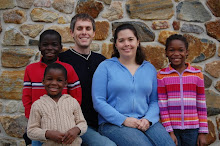When we started this blog, the intention was to keep our friends and supporters updated on our life, ministry, and prayer needs. Over time, things have shifted to "all kids all the time" because, let's face it, our kids are more interesting than we are. However, in an effort to swing the pendulum back to a more holistic view of life, I (Peter) would like to share a few things that I've been processing over the past few months.
Back in May, I went to
Uganda for the Amahoro Africa conference.
Amahoro is a word used across much of the continent and is roughly translated as “peace.”
It is similar to the Hebrew concept of “shalom,” which conveys a peace that comes from rightness in the world – or at least a desire for it. This is the beginning of a series of posts sharing my reflections on the conference. Sorry for the length. It was quite a week.
What stands out most in my mind is the almost overwhelming need of the African continent.
There are so many things that have conspired to keep it impoverished.
Lack of natural resources means lack of economic opportunities which means lack of education which means lack of skills which means lack of quality job opportunities for individuals and would-be business people.
Lack of basic health care means disease.
Malaria runs rampant.
Drought creates tenuous agricultural conditions.
This says nothing about the human element. Colonial rule sapped the limited resources and kept the continent from developing industries to compete in the global market. Government officials take advantage of their positions to help themselves instead of the people. Others wage violent conflict with the established governments because of perceived injustices or simple lust for power. Institutionalized discrimination or persecution as in the Sudan today or Rwanda in 1994 plague the continent. How does a nation find real healing and unity after those events?
Through it all, children suffer the most, forced to be soldiers or sex slaves, losing parents to violence or disease, dealing with disease themselves, and being denied even a basic education. The average life expectancy in many countries is not even 40 years, and the mass of people who cannot read or write dwarfs those who can.
For the church in Africa, other questions surface: What does African theology look like? Are they doing theology for themselves or is the West doing it for them? Where do they turn for a contextualized gospel? How much of what they practice is the non-essential trappings of Western Christianity and actually stymies the growth of legitimate expressions of African faith? Who are the role models for church leaders?
I came away with several personal challenges. I, and many concerned Christians in the US, must be more intentional and informed with my politics and influence as a voter. What does it mean to work for justice for Africa in the US? What business practices do I allow to go unchallenged or even support which do not permit a level playing field? (Check out this August 9 post about Pfizer’s activities in Nigeria.) What am I willing to give up or sacrifice in order to promote the economic health and independence of Africans? Who speaks for me as a Christian if I do not? What can I learn from Africa that will help me embrace and be reconciled to “others” in my own context? As a member of the Body of Christ, what can I do to alleviate the suffering and support the ministry of my fellow members, even though they are thousands of miles away? (In case you haven’t heard, half the world lives on less than $2 US per day, and nearly 20%- over 1 billion people- subsist on less than $1 US per day. Guess where a lot of those people live?) While these thoughts could easily become depressing and overwhelming, I believe they can also motivate me and others to action.
Stay tuned for some stories about some of the people I met and things I experienced in Uganda.





3 comments:
Great thoughts! Thanks for sharing. I appreciate being challenged intellectually and reminded how rich I really am and what a great responsibilty that yields.
My interest is especially piqued by the comments on what African theology looks like and the "western trappings". Feel free to expand.
I really appreciate your comments, we as Christians need to be compassionate and accepting of people groups and their culture and how different customs although strange are not necessarily evil in nature, but rich in history and can be honoring to God.
Great Question eeeemommy. (did I spell that right?)
Rather than subjecting you and everyone to a rather lengthy response here, let me suggest this:
Think about the difference between "Systematic Theology" and "The story of the Bible." The first is a Western approach, the second is more African (actually it's globally southern, not just African).
Send me an email at pbowersox@worldlinkonline.org and I will give a more thorough response.
Maybe we will get a blog post out of it.
Thanks,
Peter
Post a Comment